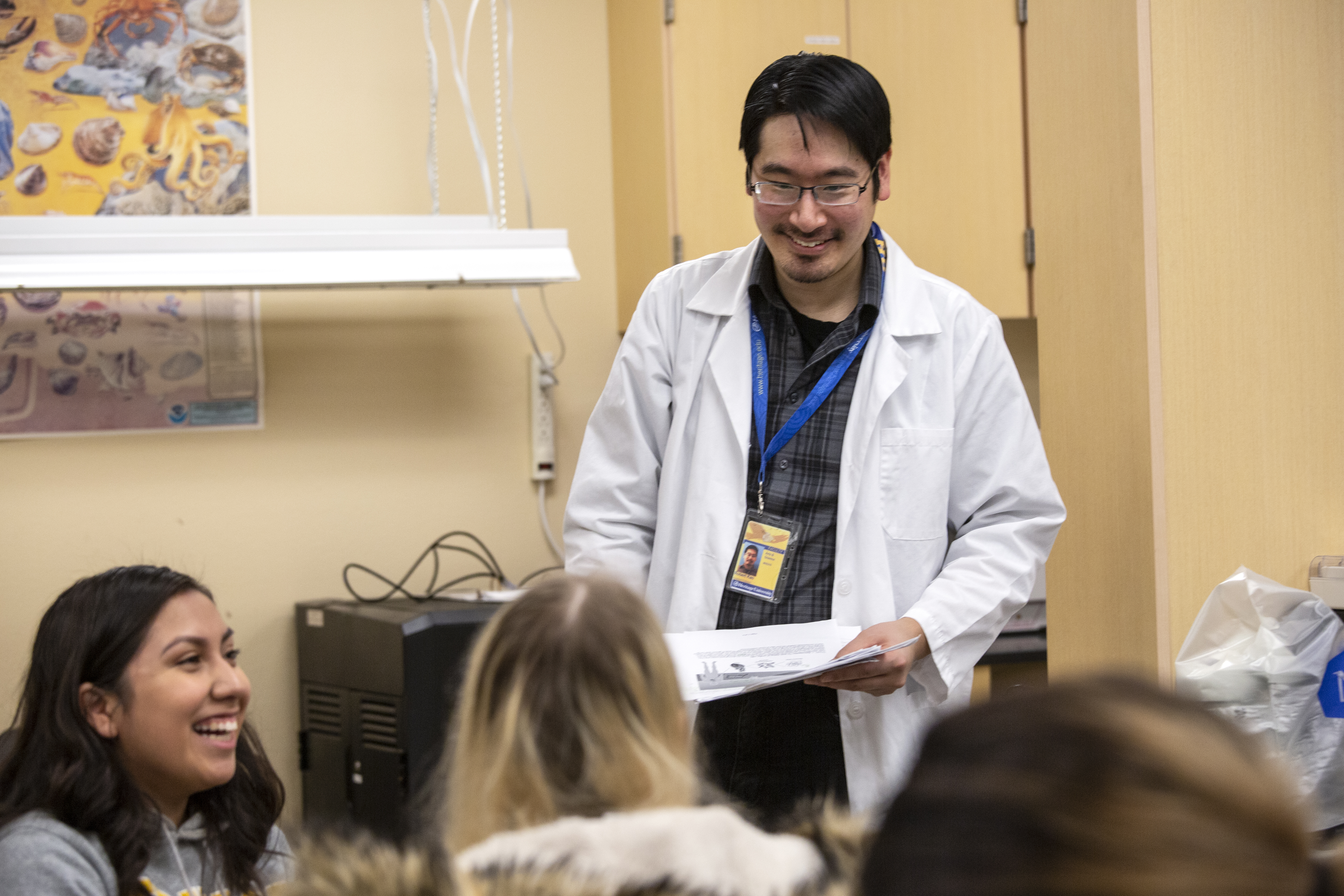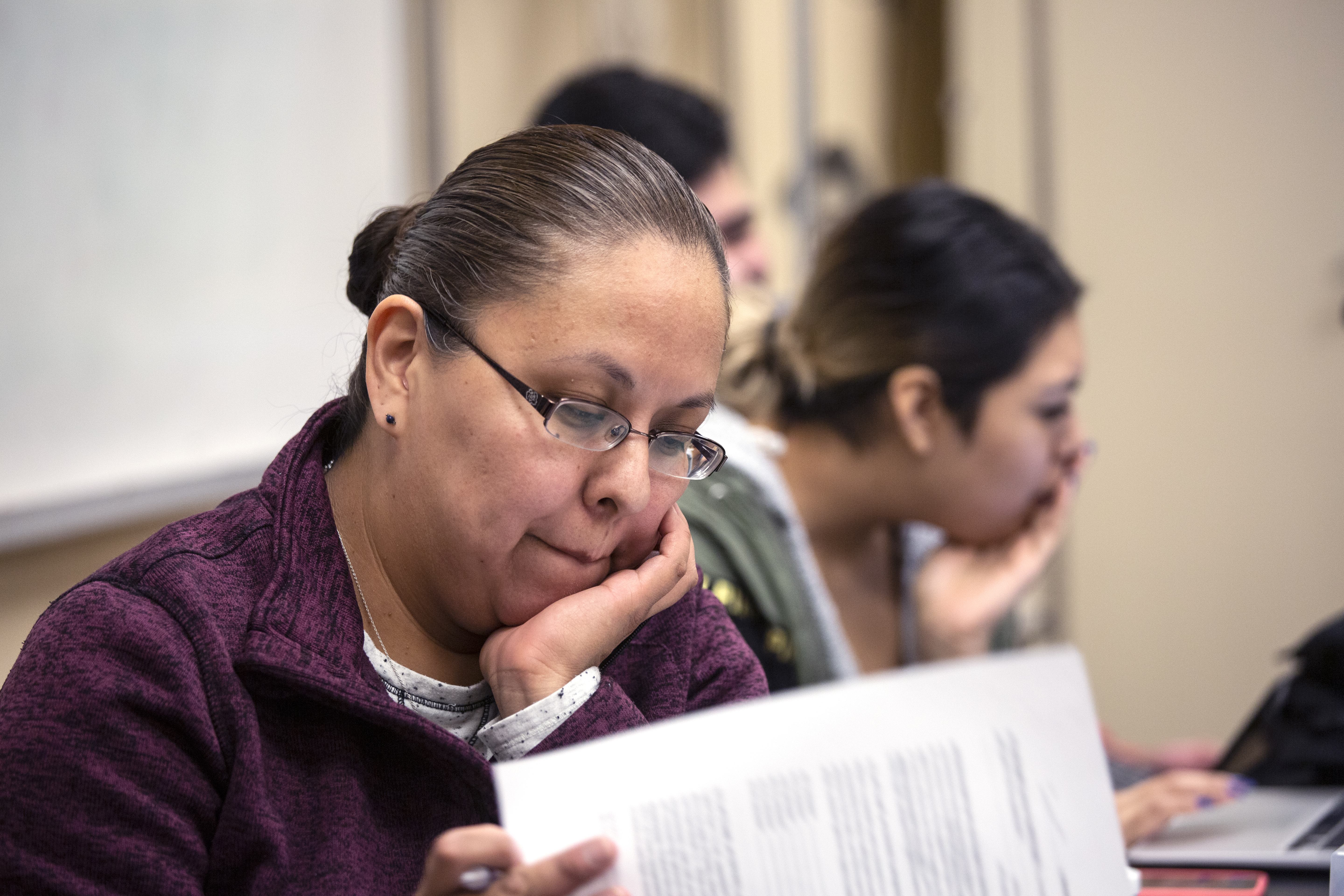Quizfolio: Innovation Through Introspection

Dr. Robert Kao leads his Biology 111 class through their lab exercise. (GORDON KING/Gordon King Photography)
Weekend homework in Dr. Robert Kao’s biology class looks a little different than other science classes. There are chapter readings and typical quiz questions about scientific terminology and functions. But using an innovative tool he developed called “quizfolio,” students are also asked to broaden their thinking by reflecting on and then writing about challenges, reactions and questions the material generates inside themselves.
Dr. Kao was inspired to create quizfolio through his own experiences as a student a few years earlier studying for a certification in Native American education. As part of his coursework, he was encouraged to journal and spend time thinking about his own thought processes, a term called metacognition. It’s a discipline he still uses every day, to grow in self- awareness about the personalized needs and experiences of those within his classroom and how he’s addressing them.
“I wanted to listen to our students about how they think and find ways to connect with individual learners.”
QUIZFOLIO QUESTIONS ENCOURAGE INTROSPECTION AND CLASSROOM DISCUSSION
Quizfolio is aptly named because it’s both a quiz and a mini-portfolio of open-ended questions based on the homework. Assigned every Friday, quizfolios are completed over the weekend and turned in on Monday before class, influencing class discussion. Students are asked to reflect on what they are learning and to recognize it’s okay to feel vulnerable when you don’t know all of the answers. He regularly reminds his classes that all scientists have vulnerable moments when they don’t know the answers and are unsure how to find them.
“Many times, when reading a text or analyzing data, something doesn’t quite make sense,” explained Dr. Kao. “It’s hard to admit we don’t know something. Some students might have a particular term that doesn’t make sense to them. Others have another. The quizfolio helps me realign and re-adjust so I can clarify the chapter readings and create more meaning for individual students.”

Vanessa Tahkeal (left) and Maria Soto review their biology lab work. (GORDON KING/Gordon King Photography)
He’s quick to point out that he doesn’t regurgitate what he’s already taught, however. He presents new information to make the material clear and relevant to them, whether it’s relating it to lived experiences in the communities of Toppenish or the Yakama Nation or in the wider world. If a student wonders how doctors develop chemotherapy, Dr. Kao might bring in a real-world example to explain the concept. Or create a quiz question on the spot, based on the class discussion. This tool provides the doctor with real-time insights into student comprehension and confidence that allows him to reshape that learning experience as he goes to meet their needs and build resiliency.
One week, students may be asked to watch a video on a first- generation scientist and write a reflection on it. Another week, they are assigned reading and writing prompts about the challenge of managing acute kidney malfunction, and then they go into the lab to study planaria, an organism that regenerates its own tissue.
“In that example, we used the quizfolio as an entry point to delve into the molecular and cellular machinery of how different organisms regenerate upon injury,” continued Dr. Kao.
QUIZFOLIO RESHAPES CLASSROOM CONVERSATION, LAB EXPERIMENTS
Considered a community of scholars, with Dr. Kao himself a member of that dynamic community, students regularly work together in teams, building relationships of trust with one another while learning to use their voices to speak up and to, conversely, take notice of the unique voices of other students.
The quizfolio often serves as a stepping-stone for the classroom teams to design their own experiments to rule-in or rule-out different possibilities. Dr. Kao knows not every student will become a scientific scholar, but he points out that critical thinking skills apply far beyond biology… into areas like test taking and later, into the students’ careers.
Dr. Kao uses quizfolio in about half of his classes and is gratified to see the level of sophistication it has developed in his upper-level students as they formulate research proposals and plot their career path.
“The quizfolio fosters student curiosity and teaches them it’s ok to ask questions,” said Dr. Kao. “The questions they are asking are questions even scientists might ask! It’s pretty neat to see that. It’s part of a journey, not the destination.”
